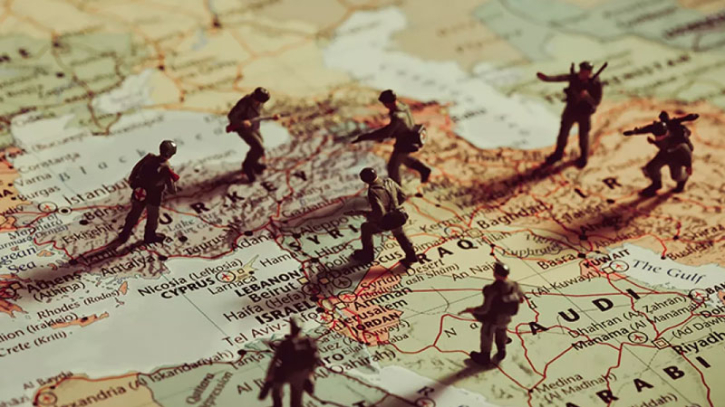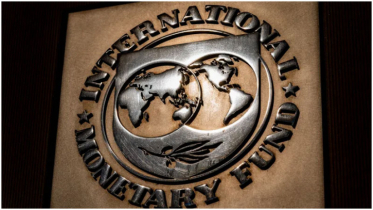Bangladesh's response in the MidEast: Crisis upholding solidarity and economic imperatives

The recent escalation in the Middle East, associated with intensified Israeli military operations in Gaza, has drawn constant global attention. The war has made ripple effects on Lebanon, Yemen and Iran, alongside uprising mass in many regions.
The ongoing conflict has provoked responses from Iran, striking missiles directly to Israel, which is unprecedented, in response to the death of many Palestinians as well as senior commanders of Iran-backed Shiite militia, Hezbollah. Regional actors like Lebanon’s Hezbollah, Iran and Yemen’s Houthi militants targeted Israeli establishments to deter further escalation of hostilities against Palestinians. As Middle East holds special significance due to its vast energy supply, religious values and geostrategic location, the crises in Middle East has become a ‘headache’ for the world.
For Bangladesh, this recent crisis signifies both humanitarian and economic implications, upholding the nation’s political solidarity to its economic aspiration for growth. Bangladesh remains committed to supporting Palestine; furthermore, it also promotes end of the conflict to protect its vital economic interests in the Middle East.
As nations confront with war and humanitarian crisis, geopolitical maneuvering, and economic motif, Bangladesh finds itself at a strategic crossroads—associated with its geopolitics as well as its increasingly interlinked role in the global economy.
Bangladesh in support of Palestine
Bangladesh’s long-standing support for Palestine is rooted in principles of justice, self-determination, and human rights.
As a country of freedom-loving people with a significant Muslim population, Bangladesh has historically supported the Palestinian cause. The official stance of Dhaka has remained firm: it supports a two-state solution along with a Palestinian State and condemns Israeli actions that undermine Palestinian rights.
Chief Adviser Professor Muhammad Yunus has urged global leaders to call for an immediate ceasefire to protect Palestinians from brutal actions and hold accountable to those who are responsible for crime against humanity. He made this call addressing the 79th United Nations General Assembly (UNGA) on 27 September 2024. Prior to that, Bangladesh also co-sponsored resolution in favor of Palestine in the UNGA.
Notably, many Palestinians have been commissioned from the prestigious Bangladesh Military Academy (BMA), thus Palestinians are officially supported by Bangladesh in their fight for freedom against oppressors. Furthermore, usually during any Palestinian crisis, Bangladesh sent humanitarian aid to Palestine with active participation from its common people. Pro-Palestinian rallies also took place in Dhaka condemning Israel’s genocidal activities.
Geopolitical implications and security concerns
The Middle East’s geopolitical advantages have led the region into incessant challenges, particularly foreign intervention, as well as wars and conflicts both from outside and within. After the Israel-Palestine war broke out, many in the region expressed their grievances on occupation, from mass protests to militia attacks on Israeli and U.S. military bases in the Middle East.
As Houthi militants from Yemen control the Hodeidah Port, along with a strategic part of the Bab al-Mandab Strait of Red Sea, states are increasingly concerned about their maritime trade routes. Although the Houthis have targeted Israeli ships and those linked to Israel, this raises alleged concerns for the U.S. administration in the area.
The current conflict brings significant challenges for Bangladesh for both of its economic and political reasons. Countries like Saudi Arabia, the UAE, Qatar, and Lebanon host millions of Bangladeshi expatriate workers. If a full-scale war breaks out in the region, Bangladesh will also face its impacts.
Remittances are the economic lifeline of Bangladesh’s economy, and it helps to bolster foreign exchange reserves and sustain domestic consumption in the country. While Dhaka’s official support for Palestine will remain firm, Bangladesh’s capacity to express concern for the Palestinian cause is quite limited.
Geographically, Bangladesh is distant from the Israel-Palestine conflict but has important affairs to address. In South Asia, Bangladesh’s geopolitical positioning is crucial for the broader Indo-Pacific security framework shaped by the U.S and its Western allies. But their stance over Palestine and the sentiment of Bangladeshi people have sharp differences that often fuels anti-western sentiment in Bangladesh.
Economic implications of instability in the Middle East
The possibility of a regional escalation can led to disruption in global oil markets and labor migration- both of which could economically impact Bangladesh. Bangladesh is already tackling economic challenges such as rising inflation, resource drain due to previous corrupt autocratic rule, and a depreciating currency.
Oil dependency and price shocks
While Bangladesh is not a major oil producer, its dependency on global energy sector is quiet significant, and it could be affected by any regional escalation. Even minor fluctuations in global oil prices can lead to a sustained crisis with far-reaching consequences. Rising oil costs would increase production expenses from transportation to manufacturing, and making additional pressure on businesses and consumers. Moreover, Bangladesh’s currency has experienced depreciation, making import costs higher.
Vulnerability of remittances and labor markets
Remittances are a significant contributor to Bangladesh’s economy, supporting millions of families and contributing to financial stability for its nationals. The Gulf and the broader Middle East, which host millions of Bangladeshi expatriates and laborers, could easily be at risk if war breaks out in the region. The recent Israeli attack in Lebanon has highlighted the risks faced by the expatriate workers. For example, the tragic death of Mohammad Nizam Uddin, a Bangladeshi expatriate killed by an Israeli airstrike in Beirut, Lebanon’s capital, has pointed out the challenges for migrants. Approximately, around 100 thousand people are working in Lebanon as both laborers and domestic workers. Around 300 Bangladeshi expatriates have already returned from Lebanon to Bangladesh after the war had started, disrupting their livelihoods and the remittances their families rely on. More are likely to follow if conflict erupts further.
Textile industry
The Middle East crisis could shift global supply chains and trade dynamics, especially when Western nations seek alternatives to Chinese production networks. All the major shipping lines have dealt with the situation by sailing around Africa with 50% increase in shipping costs and 10 days of delay. However, this created significant losses for Bangladeshi exporters, and imported goods from America also faced delays, forcing companies to make concessions, which creates vulnerabilities and often shifts bargaining leverage in favor of buyers.
Although the Houthi militias have targeted Israeli-linked ships in the Red Sea, the possibility of escalation in the area could lead to greater difficulties in the region, impacting trade and causing disruptions for countries, including Bangladesh.
The crossroads between geopolitics and economy
The Middle East crisis is continuously evolving; Bangladesh assesses both risks and opportunities. The diplomatic stance as well as mass support will always be towards Palestinian people’s desired freedom, navigating the murky water of geopolitics and economy, Bangladesh must balance its humanitarian support and historic ties to Palestine as well as economic ties to different nations. This is not a mere ideological commitment, but also a concern for justice and humanitarian cause.
Bangladesh should adopt a pragmatic diplomacy and focus on economic diversification. The solidarity can only be impactful if the country makes a sound economic resilience, an opportune hub for global investment and have fair strategic advantages in education, information, equipment of military capabilities alike. Undoubtedly, Bangladesh can play the role of multilateral diplomacy in the world.
.png)




